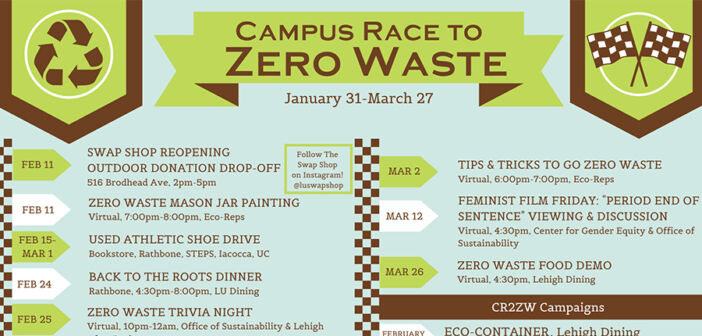The Campus Race to Zero Waste competition, an eight-week national competition focused on waste reduction and diversion, is offering virtual events and campus initiatives through the Office of Sustainability during the months of February and March.
The competition, formerly known as RecycleMania, organizes colleges and universities across the U.S. and Canada in reporting generated waste and recycling on their respective campuses.
This year, Lehigh is hosting virtual events that promote sustainable awareness and give students the resources to adapt toward more sustainable behaviors in their everyday lives.
“Our goals are to promote sustainability in general, whether that is with waste, food or water usage,” said Lexy Tracy, ‘21, an Eco-Reps coordinator. “There are a lot of different aspects of sustainability and we try to be inclusive of what sustainability looks like on Lehigh’s campus.”
The Office of Sustainability has partnered with multiple organizations on campus to host events.
Jane Le, graduate assistant of campus engagement and outreach for the Office of Sustainability, said their office is working on expanding awareness to students.
“We’re starting with extracurricular organizations to encourage and inform other students as to how their day-to-day actions can make a big impact,” Le said.
In collaboration with the Center for Gender Equity, a virtual screening of the film, “Period: end of sentence” will take place on March 12. The film centers around a group of women in a small town in India as they learn how to produce low-cost, biodegradable sanitary products.
The film highlights the fundamental importance of feminine hygiene products while also promoting a sustainable approach to basic necessities.
On Lehigh’s campus, in partnership with OrganiCup, students have the opportunity to receive free, reusable menstrual cups inside the Center for Gender Equity through the month of March.
Other campus events have already been taking place, such as a zero-waste trivia night on Feb. 25 hosted by Lehigh After Dark and a mason jar painting event in conjunction with Eco-Reps on Feb. 11.
In addition to the virtual events, the Office of Sustainability has relaunched the Lehigh Swap Shop, a free clothing store on campus aimed with the goal of reducing garment waste.
Emma Ferguson, ‘21, head of marketing and communications for the Office of Sustainability, will be running the shop virtually this semester through the Instagram page @LUswapshop.
Ferguson has been pulling pieces from the office’s inventory room and posting them to Instagram, where anyone can then direct message the page to claim a clothing item.
“It’s important that people can come to the Swap Shop and find pieces that they love without having to purchase new items to reduce clothing waste and the overall environmental impact of the fashion industry,” Ferguson said.
Two campus-wide case studies: the eco container program and the pre-consumer composting pilot, are also occurring this semester through the Race to Zero Waste competition.
The pre-consumer composting pilot involves composting food waste that doesn’t make it out of the kitchen to be served. This has been implemented in kitchens at the University Center since February.
The eco container program was initiated in light of COVID-19. Lehigh Dining made the decision to expand the reusable container program to all undergraduate students on a meal plan, significantly reducing the number of single-use containers.
Both transitions will be monitored through the case studies, as Lehigh is hoping to become the trailblazer for other institutions across the nation.
“We are excited to see the results of the study, and hopefully we can bring light to other colleges as well that these are two options that can make a big difference on a college campus,” Tracy said.






Comment policy
Comments posted to The Brown and White website are reviewed by a moderator before being approved. Incendiary speech or harassing language, including comments targeted at individuals, may be deemed unacceptable and not published. Spam and other soliciting will also be declined.
The Brown and White also reserves the right to not publish entirely anonymous comments.
1 Comment
“Include weight-based quantities for:
Recyclables, organics, other recoverable materials properly discarded in recycling / composting bins or otherwise “recovered”.
Trash or other contaminant materials improperly discarded in recycling or composting bins.
Recyclables, organics, other recoverable materials improperly disposed in trash bins.
Non-recoverable trash items properly disposed in trash bins.”
I would like to see Lehigh’s results in the above categories. I am somewhat cynical as to the actual success of recycling efforts measured by what actually ends up as a recycled product. Recycle nuts, I qualify as one, are not the problem; it is those who will throw trash on the ground if a trash can is near but will use a recycling bin if one is nearby. The word is “contrary”.
I have a daughter who often is described by that word but she now treats recyclable items as inexpensive gifts to her nutty dad. In showing my appreciation, it is a win for both of us and the environment.
Good luck in the Race to Zero Waste